In Saudi Arabia, Saudization affects expats on many levels. However, I discovered that even though I am an expat, I really know very little about the subject. So, I decided to do a little research to get clear about what it involves. Here is what I found.
So, what is Saudization?
It is a Saudi government national employment scheme also called Nitaqaa (2011) that aims to get more and more Saudi men and women into work and reduce national unemployment. The scheme obliges private sector companies and businesses to employ Saudis by replacing foreign non-Saudi workers who for decades have dominated the market. It is also an important part of the 2016 Saudi Vision 2030 reform program.
Replacing foreign workers with Saudi nationals is being done in stages and it is not without its problems.
These relate to competitiveness, training, salaries and skills development. The job of getting Saudis into employment is being done via obligatory and wholesale Saudization programs in work areas (listed below) and through a program of incentives and deterrents ( Nitaqaat Also Below).

What Are The Sectors For Saudization?
According to the new Nitaqaat laws, the following areas of work must employ 70%-100% of Saudi nationals. Implementation will be monitored and inspected by the Ministry of Labour and Social Development. (MLSD)
Interestingly, the rate of employment for Saudis in 2016/17 was 11.6% and the goal is to reduce it to 9% by 2020 and beyond.
The ratio of Saudi females to men is 23% in 2016/17 and the goal is to increase it to 28% by 2020.
5 Main Areas with Previously Saudized
- 2011-2013
- Transportation
- Construction
- Manufacturing
- Wholesale & Retail
- 2017-18
- Car Rental Outlets
12 Areas of Retail/ Wholesale Employment for Continued Saudization
- Sep 2018
- Cars/Motorbikes
- Men’s/Children’s Clothes
- Home/Office Furniture
- Household Goods
- Nov 2018
- Electrical/Electronic
- Watches
- Eye Glasses
- Medical Equipment
- Jan 2019
- Building/Construction
- Car Spare Parts
- Carpets
- Patisseries
- 2020-2021
- Coffee, Tea, Honey, Sugar & Spices
- Water & Beverages
- Fruits, Vegetables, and Dates
- Grains, Seeds, Flowers, Plants, and Agricultural Products
- Books, Stationery and Educational Services
- Gift & Luxury Items Stores, Accessories, Handicrafts, and Antiques
- Toys
- Meat, Fish Shops, Eggs, Dairy and Vegetable Oil
Areas of Tourism and Hospitality for Saudization
2019-2020
- Tourism and Hospitality Management- 3 * and above
- Administration
- Directors/Managers
- Sales/Marketing
- Supervisors
- Restaurant/Room Service
- Secretaries
- Clerks
- Malls/Shopping Centers
- NGOs
- Drivers
- Security
- Telephone Operators
- Front of Office Staff Maintenance
- Overseers
Areas of Housing and Real Estate for Saudization
- 2020-2021
- Real Estate Offices
- Contracting
- Consulting
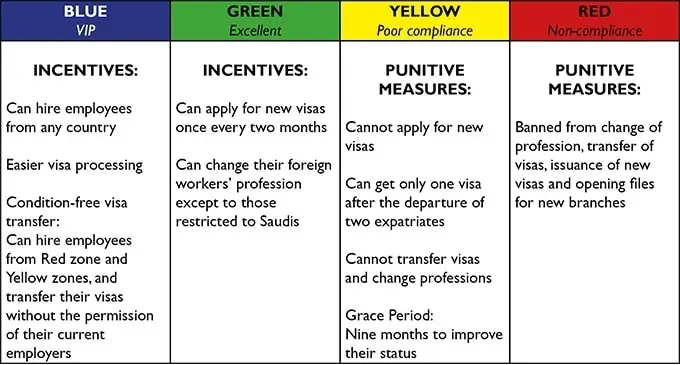
What is Nitaqat?


Nitaqat is a series of governmental controls (incentives and restrictions) on private companies in the kingdom that began in 2011 designed to have them employ Saudi workers.
The program classifies all private companies into 6 now 5 colored categories.
- Platinum
- Green (High, Medium & Low)
Yellow- Red
A Nitiqaat coloured status is assigned to each company based on three main criteria.
These include the company:
- Type
- Size
- Percentage of Saudi Employees
The goal is to have companies with more than 9 employed staff members hire a certain percentage of Saudi nationals.
The classification assigned is based upon the percentage of Saudi employees on the staff team together with the total number of employees in a company.
Those small businesses with less than 9 employees are exempt and classified as White. However, in this particular category, only one Saudi must be employed.
Treatment Under Nitiqat of Red, Green and Platinum Companies
The Saudi companies that are Nitiqaat compliant (Platinum & Green) can avail themselves of a wide variety of MLSD services and incentives that promote employee relations and their economic growth.
However, companies that don’t hire enough Saudis (Red) are penalized with severe employment restrictions and higher costs for hiring expat workers.
| Nitaqaat Status | % of Saudi Employees Required | Status |
| White | Exempt | Exempt |
| Platinum | 40% | Compliant |
| High Green | 12% | Compliant |
| Medium Green | 12% | Compliant |
| Low Green | 12% | Compliant |
| Red | 9% or less | Non-Compliant |
| Benefits | P | G | R | |
| Can Hire Employees Worldwide | Yes | No | No | No |
| Can Issue Visa Rapidly | Yes | No | No | No |
| Can Change Profession Restricted to Saudis | Yes | No | No | No |
| Can Transfer Visas (No Conditions) | Yes | No | No | No |
| Can Recruit from Yellow and Red Zones | Yes | Yes | No | No |
| Can Apply for new Expatriate Visa | Yes | Yes | No | No |
| Can Renew Residency Permits Earlier | Yes | Yes | No | No |
| Can Renew Work Permit | Yes | Yes | No | No |
| Can Get New Visas | Yes | Yes | No | No |
| Can Transfer Visas | Yes | Yes | No | No |
| Can Change Profession | Yes | Yes | No | No |
| Can Prevent Workers Up Zoning | Yes | Yes | No | No |
| Can Avoid Fines (2,400 SR) | Yes | Yes | No | No |
Important Change-Yellow Band Cancelled
On 26th January 2020, the Ministry of Labor and Social Development  (MLSD) canceled the Yellow Band. (above)
(MLSD) canceled the Yellow Band. (above)
Companies rated Yellow band will now be considered Red Band and therefore non-compliant and maintain their Nitiqaat status.
In effect, downgraded companies will be banned from three ministry services for expat workers.
They are:
- obtaining new work visas for them
- changing their occupations
- renewing work permits
However, to upgrade quickly to a higher tier, any downgraded company can now apply to join the Parallel Saudization Program (2017).
In effect, this means that these employers pay a fixed monthly penalty ‘fee‘ for each Saudi worker the company fails to hire when it is required to do so.
What is Parallel (Nitiqat) Saudization?
The Saudi Ministry of Interior and Social Affairs launched this program to support private companies struggling to hire Saudi nationals.
launched this program to support private companies struggling to hire Saudi nationals.
For a monthly lump sum of money, the government now permits companies to continue being Saudization (Nitaqat) compliant and to maintain their Nitaqat ranking.
The scheme is particularly beneficial to employment sectors in which Saudi nationals do not wish to work and where recruitment and necessary training is causing delays to Saudization for the company such as new startup operations.
The Parallel (Nitiqat) Saudization Scheme Replaces The Previous Nitaqat Support Program
The Benefits
- Nitiqat Enhancement- new cost calculations
- Nitiqat Service Improvements- Saudization rates are increased immediately if companies make 6 months prepayment.
Features
- Payments Can Be Made Monthly
- Parallel Saudization Payment Directly Tied To 26 Weeks Nitaqat Program
- 6 Month Prepayment Possible (Result: Increases Saudization % Immediately)
- 10 Days To Settle Payment Invoice
- Payment Invoice Can Be Cancelled Before 10 Day Expiration
- Companies May Cancel Subscription At Any Time
- Weekly Saudization % Updates
- Companies Continue Posting Vacancies on Taqat (Saudi employment) portal. (Green-1 week Platinum – 2 weeks)
How Do Companies Subscribe To The Parallel (Nitiqat) Saudization Program?
- Login To The Parallel (Nitiqat) Saudization Portal
 (Link broken-let me know when it’s up and running please MFS)
(Link broken-let me know when it’s up and running please MFS) - Select and Click Parallel Nitaqat Program
- Enter Saudization Nitaqat Unit Number, the Fee Amounts, and then Agree
- Confirm Mobile Number Via SMS and Enter Unit (No of new Saudis needed) Amount
- The % Saudization rate increases automatically together with Nitiqat ranking
- Fee payment will reflect in the NEXT Nitiqat Update
How To Calculate The Fees Payable To the Parallel (Nitiqat) Saudization Scheme
Procedure:
First, divide the number of Saudis you need by the number of Saudis you already employ.
Example 1:
Step 1
I employ 10 Saudis, but I need 4 more to be compliant according to the Nitaqat requirements.

Step 2
So, I divide the number of new Saudi employees I need by the number I already employ to arrive at the percentage weighting. i.e. 1/10. 2/10, 3/10, 4/10

Step 3
Then, I use the following chart to determine the amount I must pay in fees for each of the new Saudi I must employ according to the percentage % weightings I just calculated.
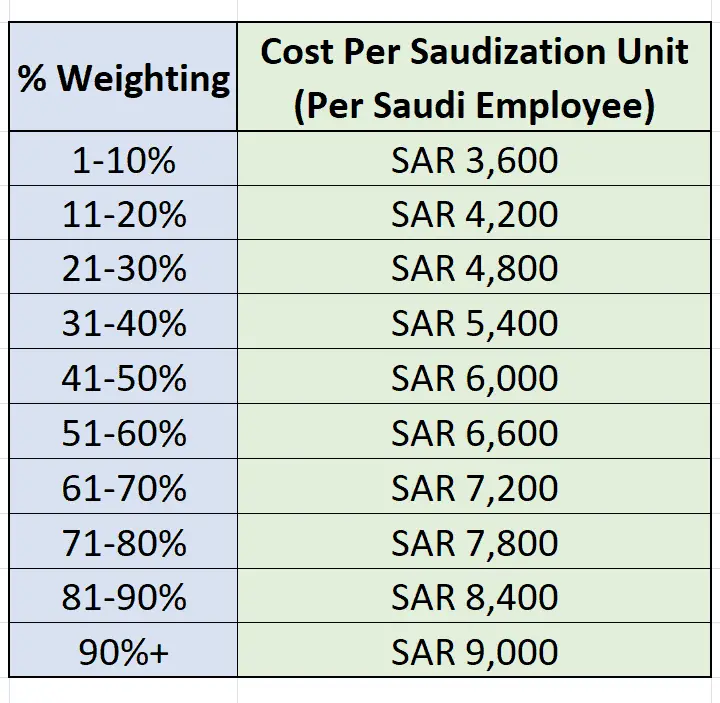
Step 4
I use the percentage % weightings from the table in Step 3 to determine the fee amount for each of the 4 new Saudis I need to employ.

Example 2:
Step 5
My other company has 20 Saudi employees and I also need 4 new Saudi employees for Nitaqat ranking. So, I divide each one of the 4 new Saudi employees I need by 20. i.e. 1/20. 2/20, 3/20, 4/20 to know the percentages %.

Note:
The fees payable in Step 5 are SR 2,400 less than Step 4 because I already have 50% more Saudi employees.
Conditions for Parallel (Nitaqat) Saudization Program Fee Exemptions And Refunds
Penalty Fees for Compliant Companies Will Be Reimbursed as follows:
| Category | Eligibility | |
| Low Green | Full Fee Refund Granted if fees paid for 52 weeks | |
| Medium Green | Full Fee Refund if fees paid for 52 weeks | |
| High Green | Full Fee Refund if fees paid for 52 weeks | |
| Platinum | Full Fee Refund if fees paid for 52 weeks | |
| Yellow/Red | Full Fee Refund if downgraded companies upgrade to low green within 12 months as of 7th Feb 2020. | |
| All Compliant Categories | Fee Exempted if Still Unpaid |
What Do Fee Refunds Mean?
By refunding penalty fees, more money can be made available in the training and hiring of Saudi nationals and by improving Nitiqaat status more expat workers can be easily hired.
The New Nitiqat Calculation Process
To speed up the process of upgrading to a higher Nitiqat tier, the new calculation process will take effect ONLY if companies have ranked in the following categories for 13 weeks or more.
The Changes In Calculation for Nitaqat Compliance
Changes affecting a company’s Saudization levels will come into effect immediately on hiring a Saudi national and NOT after 26 weeks as was the case previously.
Removing the 26-week buffer means companies in the Yellow or Red categories can become compliant quickly.
However, it will force some companies to become non-compliant and stop them from applying for block visas and renewing expat work permits.
| Category | Change | Impact |
| Low Green | Saudization levels change immediately upon hiring a Saudi national and the departure of expat. | 26 week buffer removed 2 Year Block Visas faster or slower to obtain (Previously NOT available) |
| Medium Green | Saudization levels change immediately upon hiring a Saudi national and the departure of expat. | 26 week buffer removed 2 Year Block Visas faster or slower to obtain |
| High Green | Saudization levels change immediately upon hiring a Saudi national and the departure of expat. | 26 week buffer removed 2 Year Block Visas faster or slower to obtain |
| Platinum | Saudization levels change immediately upon hiring a Saudi national and the departure of expat. | 26 week buffer removed 2 Year Block Visas faster or slower to obtain |

Why Are Saudis Unemployed?
For decades since the start of the oil boom in the 1950s, Saudi Arabia has imported foreign expertise and labourers who until today continue to work and enjoy the benefits of an expat lifestyle.
Back then, Saudis had no need to work. They were recipients of a system of royal patronage and the abundance of wealth generated by oil industries, eventually filtered down to the people.
With plenty of money to spend, there was little need to learn, get skilled and to find employment.
However, with falling oil prices 70s-90s, major increases in the cost of living and an exploding population, life began to get tough for the Saudi people and the wealth was no longer available for everyone.
The first steps to Saudization began in the 1980s and further attempts throughout the 90s and 2000s met with limited success.
The fact the expats continue to work in place of Saudis is due in great part to years of opposition from the business and employers who continue to object to hiring local Saudi workers.
They argue that Saudis are:
- too costly
- almost impossible to fire
- lacking proper skills
- have no training
- have a poor work ethic
- In general not interested in low skilled service employment
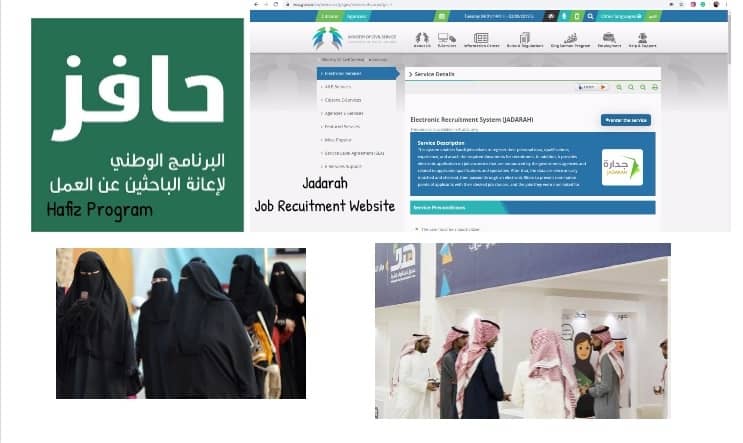
The protests arising out of the Arab Spring uprisings prompted King Abdullah to increased spending in new housing, raise government worker salaries and job creation schemes.
The new ‘Hafiz’ program, a system of unemployment benefits of 2,000 SR per month allowance given to job seekers, unemployed men and women, in particular, the youth.
Also in 2011, a Saudization program, called the new Nitaqat was launched by the Ministry of Labour and Social Development (MSLD).
It is a program of obligatory incentives to get Saudis into work and painful disincentives to punish those private companies who fail to comply.
Greater credits are awarded to companies recruiting a higher number of Saudis in place of expat workers, to raising salaries and retention rates. Credits are also added for recruiting Saudi women, students and disabled.
In the Nitaqat program, 1 disabled Saudi employee is counted as 4 able-bodied Saudi employees. Employers have preferred to hire disabled workers since employment costs are greatly reduced.
Additional fines of 2,400 SR or $640 for redundant expats together with restricted benefits are imposed on Yellow and Red Category companies.
Saudization targets are constantly updated and revised.
Also from 2017, greater rights were extended to expat children of Saudi mothers married to non-Saudi fathers.
The same rights have been granted to children of non-Saudi mothers whose fathers are Saudi. They too are allowed to work in jobs limited previously to only Saudis.
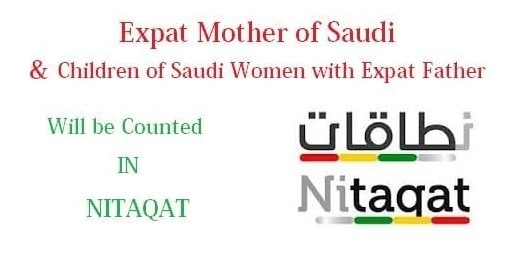
Unemployment For Saudis Is Falling But Only Slightly
Critics of Saudization complain that in spite of the increase in the number of Saudis entering the workforce, the rate of unemployment is slow to fall.
In the first quarter of 2017, the rate was 12.7%. One year later in early 2018, it actually rose to 12.8%. In the third quarter of 2019, it was 12.5%, only a small decrease in two years.
The number of expats in employment in private Saudi companies is falling by about 300,000 every quarter for males only but oddly the rate is increasing for non-Saudi females.
Saudization is happening but at a much slower rate than anticipated.

The Problems And Limitations of Saudization and Nitaqat
While Nitaqat is providing jobs, critics of the Saudization program complain that the new Saudi employees are low paid, working exhaustingly long hours and in difficult work environments.
For example, newly employed Saudis in the recently Saudized sector of Car Spare Parts complain that they have to work long hours (2 shifts for 9 hours daily) plus weekends for a very low salary of 3,000SR. (Minimum wage as of 2021 is SR 4,000 for Saudis only)
They also complain that there is no on the job training, health insurance nor perks.
These are normal conditions in the retail trade in the kingdom which for decades expats did not especially like, but were able to accept. Saudized nationals, however, cannot.
Company bosses justify paying low salaries arguing that the rates are tied to experience and that Saudis entering the job market for the first time do not have enough experience to justify a higher salary.
In spite of a lack of training and below-par salaries, retail salesman/women are expected to meet high sales targets and to make lots of profit for the company, but without any personal benefit.
The solution is for the government to provide better training, regulate salaries, work hours and weekends and holidays.
Without these measures, experienced employees cannot be retained, and they become attracted to better job offers with bigger companies with higher salaries.
Small and medium-sized companies cannot match the salaries offered by larger corporations specifically because they risk losing money and possible liquidation.
Rules and Regulations Need Updating
So far, the Saudization programs and work initiatives have not made a huge dent in unemployment figures.
New government measures and regulations are needed to ensure employment, better training and a salary that match the expectations of Saudi job seekers.
Additionally, new, more effective policies and programs are required to further increase the ratio of Saudi workers in private companies, to provide long term employment, raise salaries and benefits.
Currently, (2019) Saudis hold 23.1% of jobs in the private sector and expats are about 80%. (General Authority of Statistics 2018) Of all the jobs combined in both the public and private sectors, Saudis are 29% of the total workforce whilst expats hold 71% of all jobs in the kingdom.
So far Ministry of Labour sources report that 2,000,000 expats workers have left the kingdom following the push for Saudization, but the unemployment rate amongst Saudi nationals has altered only slightly.

The Impact of Saudization or the ‘Nitaqat’
Expats Out of MarketPlace
Saudization under ‘Nitaqat‘ has meant the slow phasing out of expat workers in ever-increasing employment numbers. Firstly, since Oct 2018, 12 areas of retail (listed above) have been reserved for Saudis only and many expat contracts have ended.
Also, all expat contracts with the government are to be terminated in 2021. Private companies’ visas too for expats are reduced from two years to one.
Companies Hiring Unsuitable Saudis
In order to avoid remaining in the Red Nitiqaat category, since 2011 thousands of jobs have been given to Saudi nationals who are neither capable nor interested in performing work duties.
In this way, companies are able to meet the Nitiqaat quota and get MLSD assistance but at a huge financial cost and without improving the Saudi workforce.
The thousands of so-called ‘fake’ jobs are likely to hurt the Saudi economy and the labor market in the long term.
This problem has led to companies beginning to provide salaried (SR 2,000, $530 per month) training courses before hiring nationals full time (SR 3,000, $800) up to SR4,000, $1065).
Expat Workers-Ease of Movement
Replacing skilled expat workers with disinterested poorly skilled Saudis is a great loss to the companies and the economy.
However, it is also very hard for foreign workers and their families.
In the Nitiqat system, expats working in Red categories do have the chance to move up in their jobs to companies that have Green or Platinum status-without the permission of their employers.
However to achieve this he/she must:
- Be employed with Red category company to go up to a Green category
- Have lived six continuous years in the kingdom
- Have worked two continuous years with the current company
- Wait until his Iqama (residency) has expired
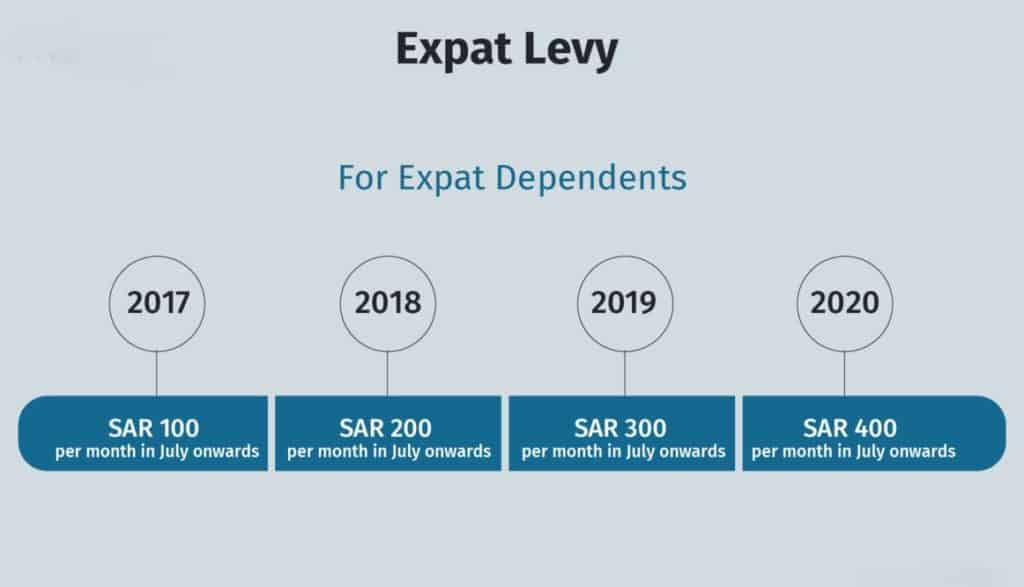
Imposing Expat Levies and Penalizing Non-Compliance
In 2017, the Saudi government started imposing expat business levies as a means to punish companies by increasing the employment costs of companies employing a majority of expat workers,
Additional fees are also charged on companies where expats outnumber Saudis.
Also in 2017, a personal expat dependents tax was levied at expat workers and their families. More punitive measures are set to hit expats and their employers including obligatory recruitment online, high visa fees and restrictive job descriptions by the MLSD.
See this helpful link to read more about The Real Cost of Expat Levies In Saudi Arabia and Guide To Payment.

Incentivizing the Workplace for Saudis
In addition to phasing out of a massive number of expatriate workers to be replaced by Saudi nationals, state policies now require that the private sector is increasingly an ‘attractive and rewarding’ prospect for young nationals.
‘Vision 2030’ or the reform master plan launched in 2016 aims to achieve a ‘thriving economy‘ through diversification (non-oil industries) and the creation of knowledge-based industries in the kingdom.
This is to be achieved in the following way.
- Investment in Education
- Fostering high valued, service orientated industries
- Developing Hi-Tech Industries
- Targeting IT and Telecommunications as privileged labor centers

Expats Returning Home in Droves
Many low- income and middle-income foreign workers have been badly hit by the levies and cannot afford to pay.
Thousands have sent their families back home and continued working in the kingdom on a bachelor status. The most affected nationals are Asians from India, Pakistan, Sri Lanka, Philippines, Bangladesh and Nepal.
In 2019 more than 800,000 foreign workers per year are returning to their home countries. Ironically, as a result, the employment figure for Saudis has fallen only slightly to 12.5%

Closing Businesses and Companies – Falling Skilled Labour
The Jeddah Chamber of Commerce (JCCI) predicts that between 25% to 30% of all private businesses may shut down due to the loss of skilled expat labor.
Currently, 15.6% of business establishments in Jeddah are on the verge of collapse and 11% are facing financial hardships. (MFS)
The departure of foreign workers and their families seems to have negatively impacted the economy. Businesses too are under strain.
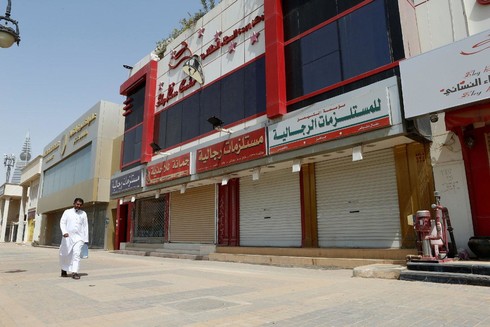
Depressed High Street and Local Retail Businesses
Also, rents in most Saudi towns and cities have plummeted and the streets are full of advertising signs for rent of vacant apartments and shops. Today, this is a very common sight.
Private businesses have been forced to close due to higher costs and lower sales.
For example, many rent a car company cannot pay the high salaries demanded by Saudis and nor meet the operational costs of running vehicles and so have closed down.
Private Schools Closing Down
Finally, it is estimated that about 30% of private schools have been affected and that some are set to close down.
Foreign student numbers have fallen since expats have sent their children to their countries of origin to resume studies.
Fewer students, of course, mean fewer fees and in turn caused severe budget restraints. Private schools are beginning to feel the pinch and are beginning to close down.
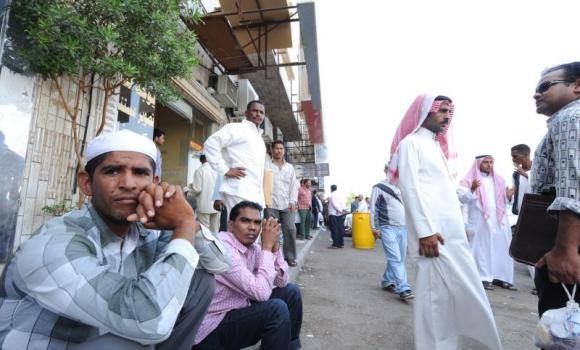
The Future
Saudi Arabia is no longer the land of plenty and of great opportunity for expats. Saudization, VAT taxes, a slower than normal economy combined with governmental restrictions and threats of termination means the kingdom is not a favourable destination for foreign workers as it once was.
Nitqat has resulted in creating more jobs for Saudis, especially women. Yet, in spite of the massive yearly deportation of foreign workers since the program began, unemployment has dropped to only 12.5%. (30.9% for women and 7.6% for males).
Observers explain that in addition to the vast scale of ‘fake‘ Saudization’, the market still needs to:
‘ Shift the Saudi labor force to take on higher-paying white-collar professional service roles and create a working class of Saudis willing to do service sector, retail, and construction jobs‘
Saudi Gazette, 2018
Related Questions
Is ‘fake‘ Saudization a problem? Yes, the World Bank criticized Nitaqat for forcing companies to hire nationals who are unsuited to the job positions.
To circumvent regulations, so-called ‘fake‘ jobs were created, no tasks were undertaken, and Saudi employees remained at home. 20,000 jobs out of 200,000 annually were given to nationals. The remainder were ‘fake‘ jobs.
